Key takeaways:
- Planning burnout is caused by unrealistic expectations and can be managed by identifying personal triggers such as overcommitment and perfectionism.
- Effective planning strategies include prioritizing tasks, breaking projects into smaller steps, and maintaining flexibility in your schedule.
- Self-care practices, such as mindfulness and nurturing supportive connections, are essential for mental well-being during planning burnout.
- Reflecting on progress and being open to adjustments fosters growth and enhances motivation, turning setbacks into opportunities.
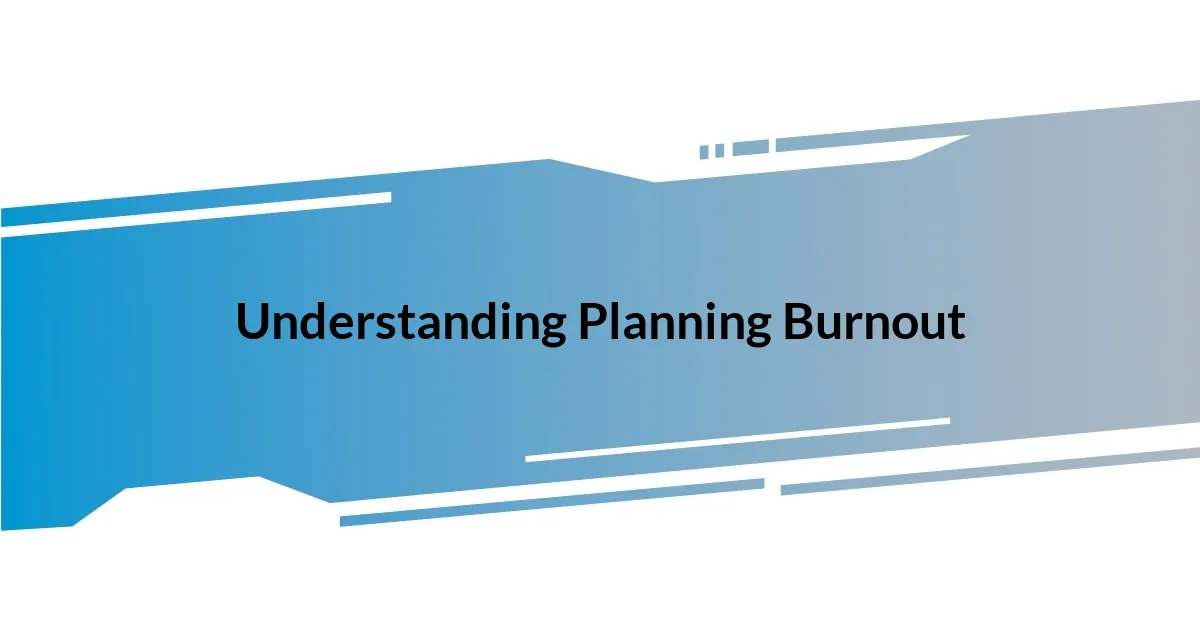
Understanding Planning Burnout
Planning burnout is a unique form of fatigue that emerges when the weight of organizing and scheduling becomes overwhelming. I remember a time when I had multiple events to coordinate; I felt like I was juggling too many balls in the air. Have you ever felt that stark moment when your brain just can’t seem to keep up with the endless checklists?
It’s a sneaky process that creeps in over time, wearing you down bit by bit until everything feels dull and uninspiring. I often found myself staring blankly at my planner, feeling no motivation to fill it out. It’s a heavy emotional burden when planning, something that usually excites you, turns into a chore that you dread.
What’s crucial to understand is that this burnout can stem from unrealistic expectations—both from ourselves and others. I once believed every detail had to be perfect, leading to crippling anxiety. When I finally asked myself, “What’s the worst that could happen?” I realized that imperfection could actually open the door to creativity and spontaneity. Isn’t it interesting how reframing our thoughts can lead to a shift in perspective?
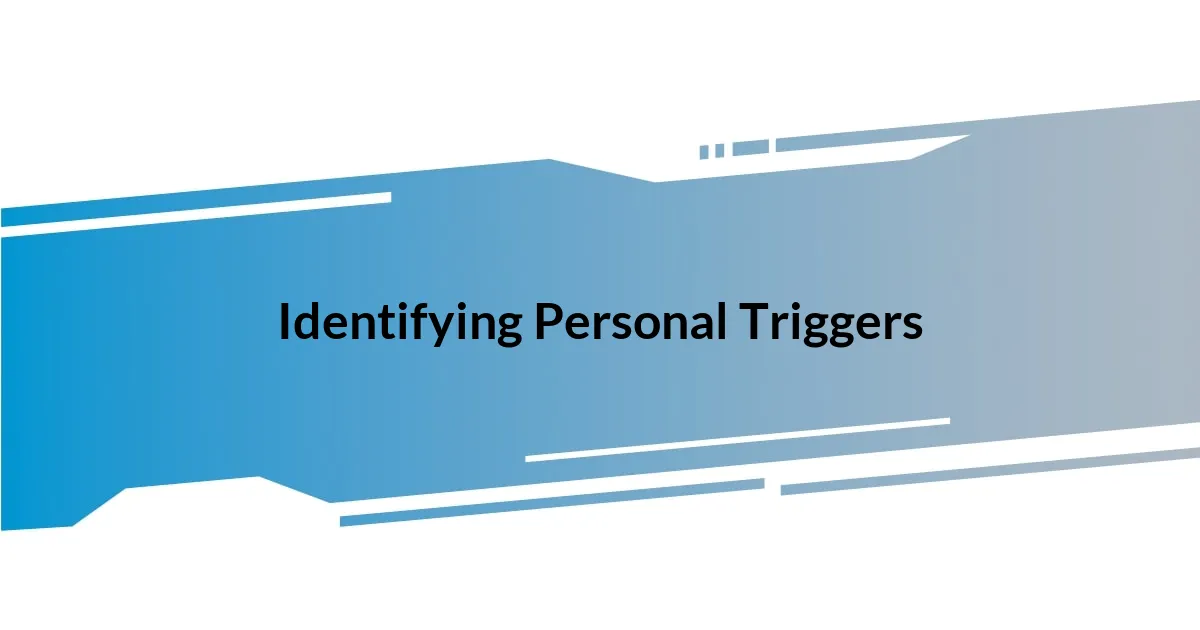
Identifying Personal Triggers
Recognizing my personal triggers was a turning point in managing planning burnout. During that overwhelming period, I noticed patterns in my anxiety. For example, if I had back-to-back commitments without any downtime, my stress levels spiked. It almost felt like I was pushing a boulder uphill. Now, I pay close attention to the situations that typically drain my energy.
Here’s a quick list of my specific triggers:
- Overcommitting: Saying yes to every request or invitation without considering my own limits.
- Lack of breaks: Not scheduling time for myself between tasks, which leads to feeling stretched thin.
- Comparing myself to others: Seeing how others plan can amplify my insecurities and add pressure.
- Perfectionism: Fixating on every small detail until I feel paralyzed.
- Unrealistic timelines: Setting ambitious deadlines that leave no room for hiccups.
By identifying these triggers, I empowered myself to make thoughtful adjustments that ultimately fostered a healthier planning routine.
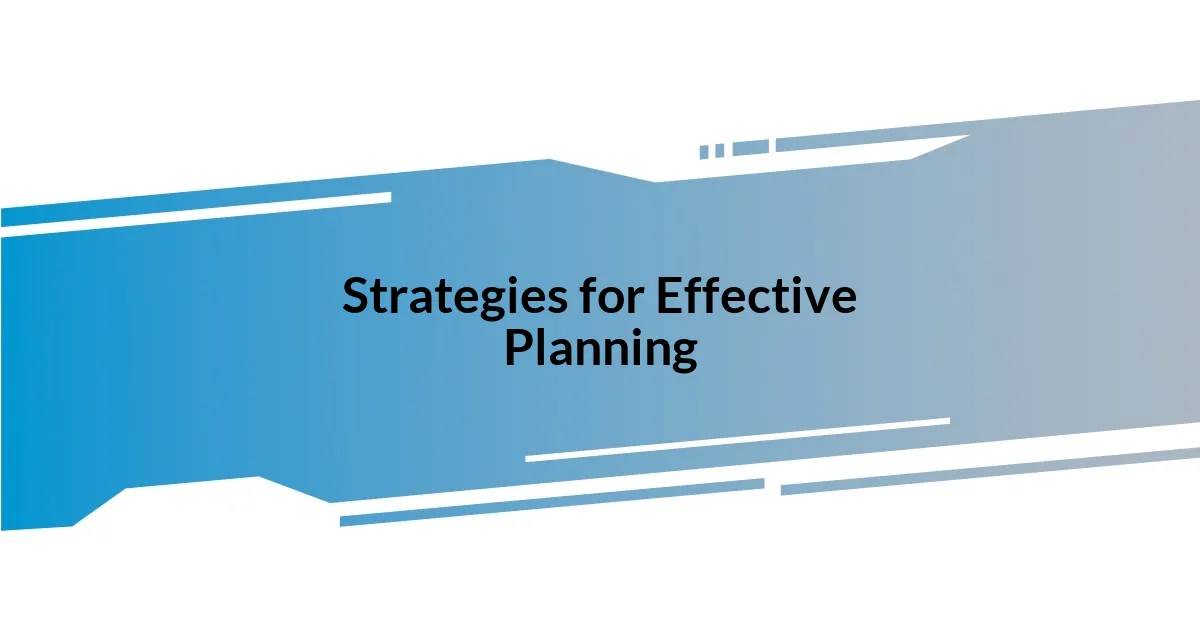
Strategies for Effective Planning
When it comes to effective planning, I’ve learned that prioritizing tasks makes a world of difference. I used to approach my to-do list with overwhelming enthusiasm, trying to tackle everything at once. But then I discovered the power of the Eisenhower Matrix. It helps me categorize tasks by urgency and importance, turning what seemed like chaos into a more manageable flow. Have you tried prioritizing tasks in a similar way? It changed how I view my day and my mental load.
Another strategy that I swear by is breaking large projects into smaller, actionable steps. Once I faced a daunting event planning assignment that felt insurmountable. By breaking it down into bite-sized tasks, I turned a heavy weight into stepping stones. Each small victory kept my motivation alive and provided me with a sense of progress, which can be incredibly uplifting. Isn’t it great how ‘one step at a time’ really works?
Finally, I’ve embraced the value of flexibility in my planning. There was a time when I believed all my plans had to be set in stone. Now, I regularly allocate buffer time for unexpected changes. This shift not only reduces my stress but often leads to delightful surprises. I wonder how many times a little flexibility could brighten our days?
| Strategy | Description |
|---|---|
| Prioritization | Use methods like the Eisenhower Matrix to categorize tasks by urgency and importance. |
| Break Down Projects | Divide large tasks into smaller, actionable steps to maintain motivation and manageability. |
| Flexibility | Allow for adjustments in plans to accommodate unexpected changes, reducing stress. |
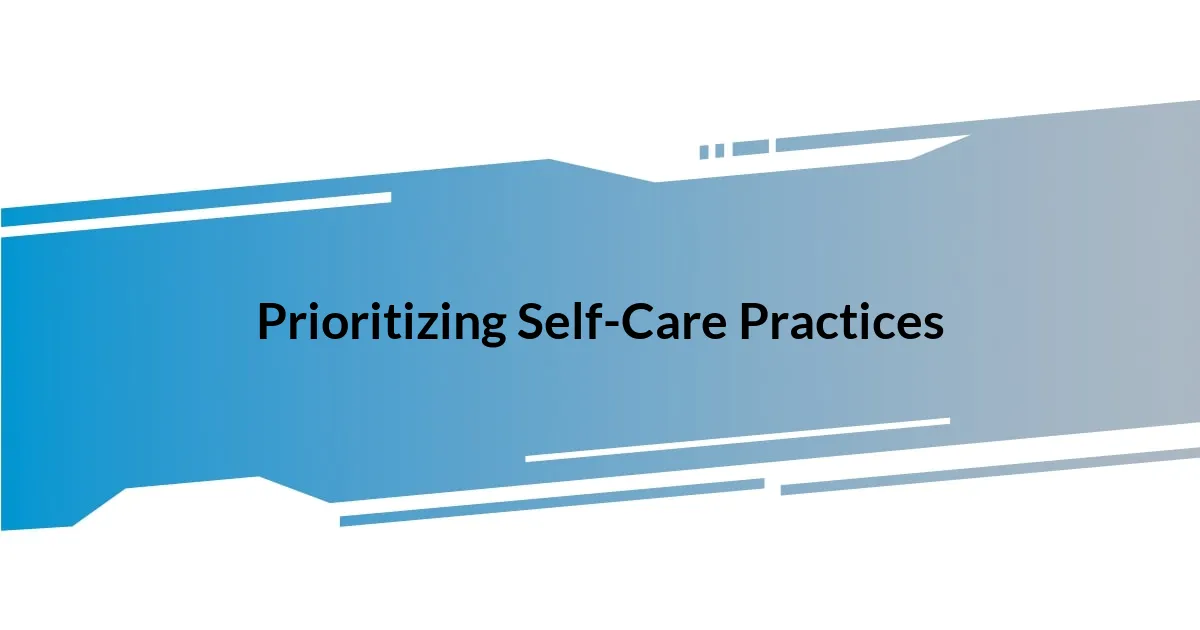
Prioritizing Self-Care Practices
Taking care of myself became a necessity when I recognized the toll planning burnout was taking on me. I started dedicating specific time blocks in my calendar just for self-care. Whether it was a midday walk to clear my mind or indulging in a leisurely hobby, I found that these small breaks provided a refreshing burst of energy. Have you ever felt a weight lifted just by stepping outside?
I also began to explore mindfulness practices, which were game-changers for my mental clarity. On particularly overwhelming days, I would spend a few moments focusing on my breath, grounding myself in the present. I remember the first time I tried meditation; it felt awkward at first, but gradually, it became a sanctuary where my racing thoughts could settle. Isn’t it fascinating how just a few minutes can transform your perspective?
Additionally, I learned the importance of surrounding myself with supportive connections. Having friends who understood my journey was crucial for my emotional well-being. We would often share our struggles, and it allowed me to feel less isolated. I’ll never forget the late-night chats filled with laughter and validation—they were reminders that self-care isn’t just about the solo practices; it’s about fostering relationships that uplift you, too. Have you reached out to someone lately? It might be what you need.
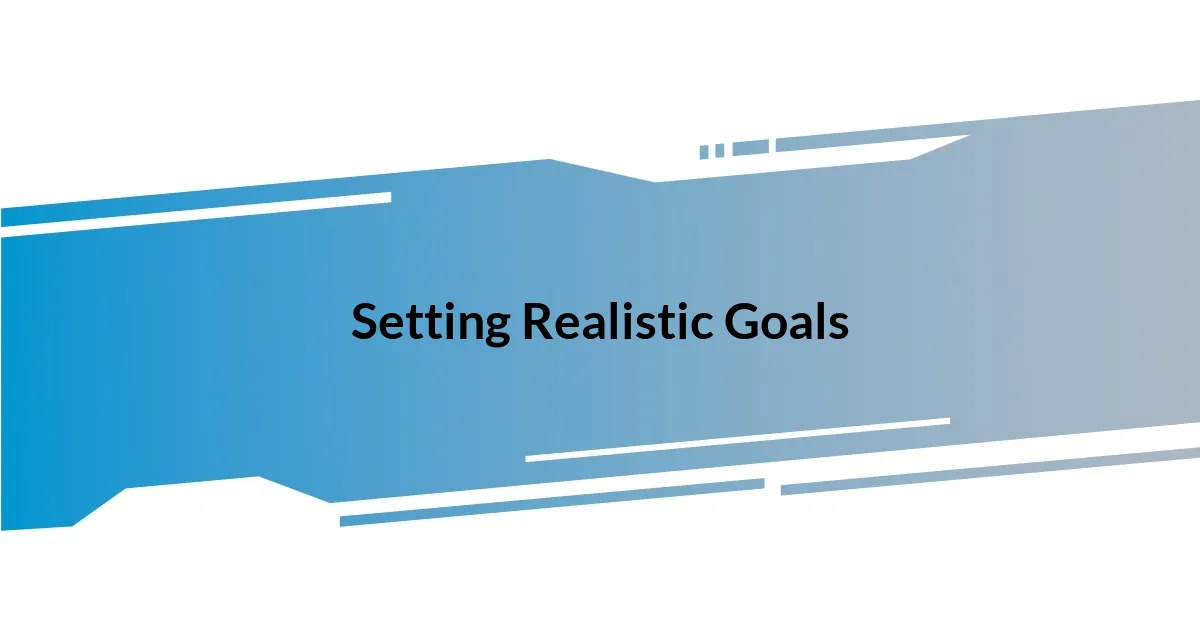
Setting Realistic Goals
When I started to set realistic goals, one lesson stood out: it’s vital to align my aspirations with what I can genuinely achieve. I recall planning an event and thinking I could juggle a hundred details all at once. The reality hit hard when I felt overwhelmed, realizing I had taken on too much. Now, I make it a point to assess both my workload and my emotional capacity before diving in—an honest self-check can save a lot of headaches down the road. Have you ever taken a moment just to evaluate what’s feasible for you?
I also remember a time I decided to set a goal to learn a new skill every month. Sounds exciting, right? However, by the end of the third month, I felt burned out instead of accomplished. I learned that setting a single, realistic goal—like perfecting one skill over three months—felt far more rewarding. Each small milestone brought joy and motivation, which, to me, became more important than trying to do everything at once. Doesn’t it feel liberating to focus on progress rather than perfection?
Ultimately, I’ve found that celebrating small achievements transforms my perspective. After finishing a challenging project, I started treating myself to little rewards—like a nice dinner or a relaxing evening with a good book. These moments of recognition have become crucial for my motivation. It’s a reminder that whether big or small, every achievement deserves acknowledgment. How do you celebrate your wins? I genuinely believe it’s essential to cherish those moments to keep the fire burning.
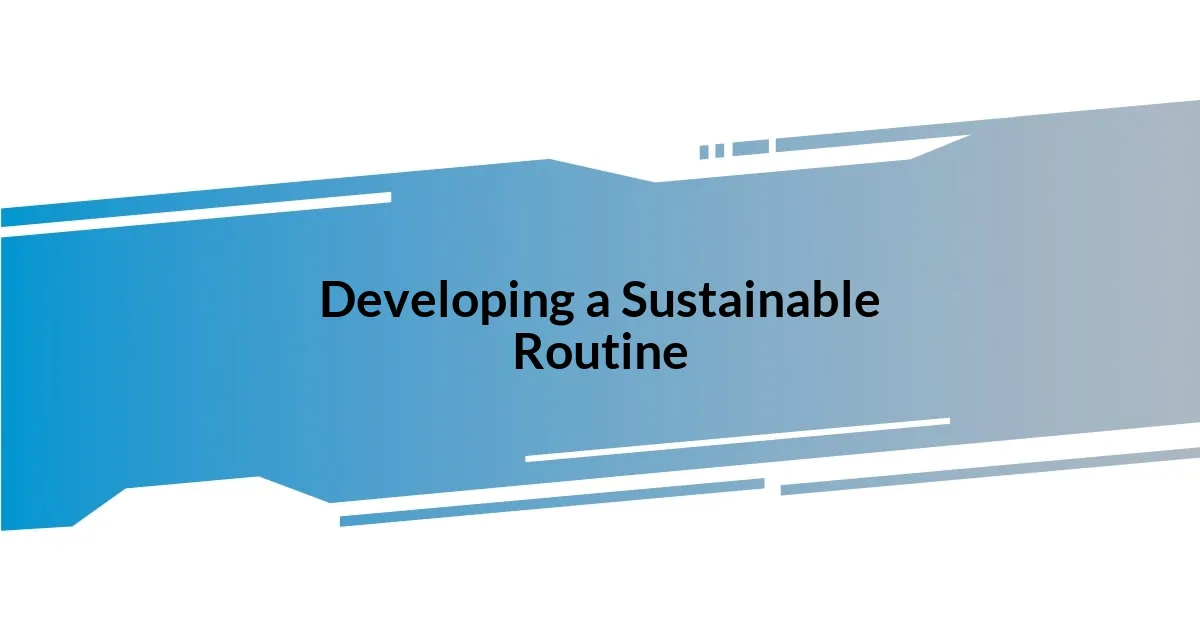
Developing a Sustainable Routine
Developing a sustainable routine has truly been a transformative journey for me. I remember those chaotic days when my schedule was overflowing, leaving no room for spontaneity or self-reflection. To combat this, I adopted a weekly planning ritual every Sunday. It became my sanctuary—setting aside an hour to outline my week ahead, I could gauge what was manageable. Have you ever felt the relief that comes with simply having a clear plan?
Another crucial step I took was to incorporate periods of rest into my daily routine. Initially, I scoffed at the idea of a “break,” convinced it would derail my productivity. Yet, when I began scheduling short, intentional breaks—like sipping tea while enjoying a few pages of a book—I noticed a remarkable shift. Those few moments of pause became pockets of joy, helping me recharge rather than withdraw. Isn’t it amazing how a little time for yourself can reignite your passion?
Lastly, I found that flexibility is a key ingredient to sustainability. Early on, I was rigid in my approach, feeling guilty if I didn’t stick to my plan perfectly. But I learned that life is unpredictable, and allowing myself to adjust my routine brought a sense of freedom. If something unexpected arises, I simply shift my tasks around without stress. I still recall the first time I let go of my rigid schedule—it felt liberating, almost like shedding a heavy coat. What about you? How do you adapt to life’s little surprises without losing momentum?
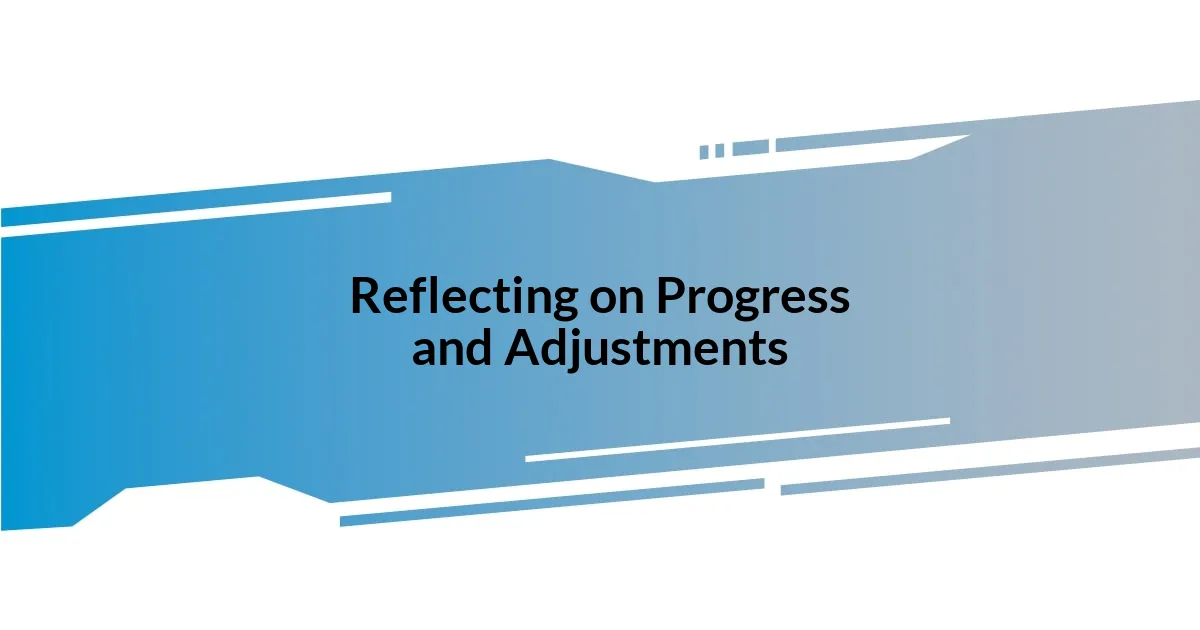
Reflecting on Progress and Adjustments
Reflecting on my progress brings a mixture of pride and humility. There was a time when I fixated on the end goal, neglecting the small, but significant steps I had taken along the way. One evening, while reviewing my planner, I stumbled upon a checklist of tasks I had completed over the month. Each tick mark was a reminder that every little effort counts. Have you ever rediscovered the joy in your progress and felt that spark of motivation reignite?
Moreover, I realized that adjustments are not failures but rather opportunities for growth. I vividly recall a project where the original timeline was too ambitious. Rather than despairing, I decided to reevaluate my deadlines and broke it down into phases. This approach not only made it manageable but also led to surprises—like a sudden peak in creativity during one phase that resulted in an even better outcome than I had envisioned. How often do we overlook the potential rewards of being flexible in our plans?
It’s fascinating how reflection can serve as both a mirror and a compass. After a particularly long week, I made it a habit to journal about what worked and what didn’t. Doing this opened my eyes to patterns I hadn’t noticed before. I learned that certain strategies brought me joy and efficiency, while others led to burnout. Isn’t it intriguing how our experiences shape our future decisions? This practice of reflection has become a cornerstone of my planning process, reminding me that understanding where I’ve been is crucial for charting where I want to go.